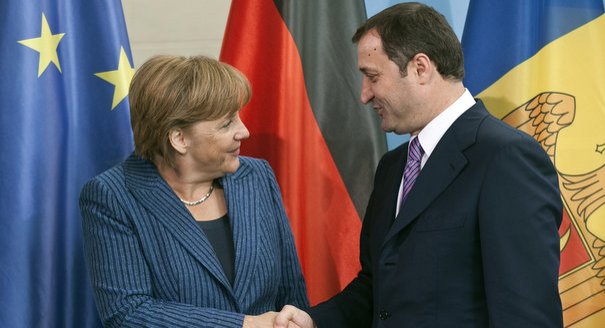Considering that Moldova is just a small and rather new country sandwiched between Ukraine and Romania, Germany has invested a surprising amount of political capital there.
The foreign minister, Guido Westerwelle, visited it in 2010, the first such visit since Moldova broke away from the former Soviet Union in 1991.
And this Wednesday, Chancellor Angela Merkel made a one-day official trip. This was the first occasion for a German leader to see this country of 3.5 million people that is struggling with fighting corruption, building a democracy, and above all, dealing with Russian meddling.
The official reason for Merkel’s visit was the 20th anniversary of the establishment of diplomatic relations between Berlin and Chisinau.The unofficial reason is more complex.
Merkel has been trying to melt one of the last “frozen conflicts” that have existed on the fringes of Europe since the end of the Cold War.
There are three of them: the Nagorno-Karabakh dispute between Armenia and Azerbaijan, the status of Georgia’s breakaway regions of Abkhazia and South Ossetia, and finally, separatism in the Moldovan province of Transnistria.
In all three cases, resolution is blocked by Russia.
In Transnistria, Russia has done everything possible to encourage this region to break away from Moldova, supporting it financially and militarily.
It has kept some of its troops and munitions there, left over from the Soviet era, even though under the terms of the amended 1999 Conventional Armed Forces in Europe Treaty Russia was supposed to complete the withdrawal.
Russia suspended all participation in the CFE treaty in 2007, which has undermined the territorial integrity of Moldova and prevented a settlement to this frozen conflict.
For two decades, Transnistria was run by President Igor Smirnov who treated the province as his personal Russian–backed fiefdom.
He disrupted trade and people contacts between both sides of the Dniester River that runs between Transnistria and the rest of Moldova by building heavily-guarded ‘border’ controls.
He has banned the use of the Moldovan language (essentially Romanian) in public places. All signs are in Cyrillic. The press is heavily censored. Dissent is not tolerated. Smuggling, controlled by a few oligarchs, is rife.
With so many other bigger topics on her plate, why then has Merkel taken such an interest in Moldova?
One reason is that Moldova is sitting on the borders of the European Union and any unresolved conflict there remains dangerous and unstable. Another is that Merkel wanted to use the frozen conflict in Transnistria as a test case for Berlin’s relations with the Kremlin.
In May 2009, when Merkel met then Russian president Dmitri Medvedev in the German government’s guest house in Meseberg, just outside Berlin, she made him a very interesting offer. The EU would consider establishing security cooperation with Russia in return for Moscow supporting negotiations that would guarantee Moldova’s territorial integrity.
Despite the bonhomie between Merkel and Medvedev, Russia did not deliver. Real power rested with Vladimir Putin even then.
Just before leaving office, Medvedev (or rather Putin) last March appointed deputy prime minister Dimitry Rogozin as the Russian President’s special representative to Transnistria.
In his former posting as a Russian ambassador to NATO, Rogozin was confrontational and nationalist. In his new job, he is expected to maintain a strong Russian influence in Transnistria.
Economically, the province is totally dependent on Russia anyway. Russia even pays the pensions of the security forces. But the younger generation is dissatisfied, seeing its prospects dwindle in this tiny would-be country.
And then there is the long overdue leadership change in Transnistria.
Smirnov was last December beaten into third place during the presidential election. His successor is Yevgeny Shevchuk who ran a campaign promising to combat corruption, improve the economy, allow more freedom, and improve ties with Chisinau.
He also insisted, however, that he would seek international recognition of the independence of Transnistria, but through negotiations.
Shevchuk was true to his word with regard to improving links with Chisinau. The 100 percent customs duty on goods imported from Moldova to Transnistria was scrapped. And it is now easier for traffic to cross the Dnieper River.
Such small improvements will not deter Russia from giving up its influence in Transnistria. For Putin, It is too much of an important political card.
Putin dreams of establishing a Eurasian Union, or smaller version of the Soviet Union that would include Moldova. His most important tool—besides using Transnistria as a pawn—the fact that Moldova is totally dependent on Russian gas.
Yet the government in Chisinau, led by Vlad Filat, is intensely pro-European. With financial support from the EU, it has embarked on reforms of the police and judiciary and the public administration in order to combat corruption and create stronger and more accountable institutions. The media too is becoming more open.
The result is that relations between Chisinau and the EU are improving and funds are increasing. The EU has already pledged up to €550 million in assistance to Moldova in the period 2010 – 2013, an enormous sum of money.
And if Moldova continues with reforms, it can, in the logic of Brussels’ “more for more” policy, expect further trade, economic and political benefits. If this strategy works, it will not only make Moldova a better place, it will also demonstrate to Transnistrians the benefits of cooperating with Europe
Where does Merkel’s visit fit in?
First of all, it is interesting to note that it unsettled Russia to the extent that prior to Merkel’s visit the Russian ambassador in Berlin summoned his Moldovan counterpart about the motives her trip.
Secondly, it was encouraging to see the enthusiastic reception that Merkel, as Europe’s most important envoy to date, received in Chisinau.
Moldovans—and probably, Transnistrians, too—would clearly like nothing better than to fully belong to the European Union even though that is not an option, at least not in the foreseeable future. But If Brussels plays its cards right, the lure of Europe might prove strong enough to weaken Russia’s influence in this corner of Europe.
Source: Carnegie Europe


